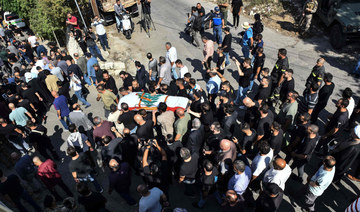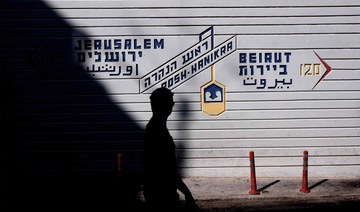BEIRUT: Lebanon’s caretaker prime minister, Najib Mikati, said on Monday Beirut had been working to ease tensions along its southern border with Israel and avoid dragging the country into a new war.
“Lebanon is in the eye of the storm, and the region as a whole is in a difficult situation,” a statement from his office said.
The Lebanese government remains critical of Israel but fears a new war could further devastate its battered economy and risk the lives of its people.
Israeli Prime Minister Benjamin Netanyahu warned Iran and its Lebanese affiliated group Hezbollah not to “test” his country in a speech on Monday to the Israeli Knesset.
Mikati also said that his government was continuing at home and abroad to keep the situation calm inside Lebanon as much as possible and to distance itself from the repercussions of the ongoing war in Gaza.
The prime minister has spoken by phone with top US officials, heads of state, and top diplomats from the UK, France, Turkiye, Qatar, Jordan, and Italy.
Lebanese authorities should take all necessary measures to avert a war with Israel, France's Foreign Minister Catherine Colonna said in Beirut on Monday.
Turkish Foreign Minister Hakan Fidan will visit Lebanon on Tuesday to discuss regional, global, and bilateral issues.
Mikati also said that no one was interested in taking risks and opening a front in southern Lebanon because the people could not bear it.
“No one can predict what might happen. Everything changes by the hour according to the course of events, and no one can predict anything,” he said.
But he blamed Israel for seeking to “increase its provocations.”
Mikati’s remarks came as the Lebanese Armed Forces dismantled seven ready-to-launch Grad rockets near Hanniyeh — a small town in the Tyre District within the UNIFIL area of operations in southern Lebanon.
Israel and Hezbollah remain on high alert on the Lebanese border after a tense and cautious night, when Israel fired flares and phosphorous shells over the area.
Sunday witnessed Israeli airstrikes on Hezbollah targets, including a site belonging to the “Green Without Borders” organization.
However, daily skirmishes on the southern Lebanese border and Gaza Strip remain controlled under previous international agreements and rules of engagement since 2006.
An Israel Defense Forces statement announced a plan to evacuate residents up to 2 km from the Lebanese border to state-funded guesthouses.
The IDF also claimed that Iran instructed Hezbollah to carry out Sunday’s attacks on the border.
“We have strengthened our units on our northern border and will respond firmly and forcefully to every operation against us,” said army spokesperson Avichay Adraee, who added that Hezbollah fired shells on Sunday “at the request and with the support of Iran, in an attempt to divert our attention from operational efforts in the south, thus exposing Lebanon and its citizens to danger.”
Adraee also warned that “if Hezbollah miscalculates in provoking us, the response will be deadly.”
Hesham Dibsi, a Palestinian researcher and director of the Tatwir Center for Studies, told Arab News that the escalation on the Lebanese border with Israel coincided with the hardening of Arab political positions on Israel and led to the US changing its tone.
“This, in turn, led to embarrassment for the Iranian side, which had stressed that it would not intervene in the war unless Israel targeted it,” he said.
“Pending developments, the clash between Israel and Hezbollah will not deviate from the rules of engagement.”
Lebanese Forces Party MP Fadi Karam said “the decision to go to war today is in Iran.”
He added: “After monitoring the Iranian and Israeli rhetoric since last Saturday, it seems the step was taken to enter the war.
“If Hezbollah enters the war, we do not know what will happen to Lebanon, and if Iran also joins in, what will Russia’s position be?”
Karam added he believes that the deadlock over the appointment of a new Lebanese president meant the country’s opposition had inadvertently hindered possible Lebanese engagement in Israel, as Hezbollah had been frustrated in selecting a president loyal to it.
“If the party had been able to do that, we would have gone ahead of Hamas in the war against Israel,” he said.


























